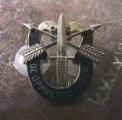As I recall from reading Gen Balck's post-war interviews about operations on the Eastern front as an LT; a typical German Panzer BN was often reduced to about 7 tanks, BC in his tank, Two Co CDRS in theirs, each with two plt ldrs in theirs; and they would go up against TOE Russian BNs and fare quite well due to the high level of experience of those surviving crews. (All a result of Hitler always wanting to send more units, and not reinforce the units already in theater). Though Stalin was right that "quantity has a quality all of its own," just attriting the other guys numbers in no way ensures success.

















Bookmarks